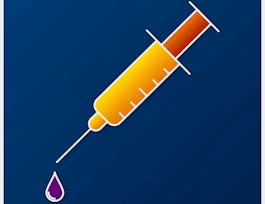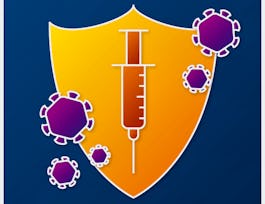This course describes how viruses interact with their hosts to infect, replicate, spread and cause disease. It looks at what controls the specificity of viruses for different host species and for different tissues within a host, also how this can lead to outbreaks and pandemics. It seeks to show how virus evolution is driven by the pressures to replicate and spread. Finally, it looks at how we can find antivirals and use them to control infections, distinguishing therapeutic approaches to prophylaxis by vaccination.


What Do Viruses Do And How Do We Control Them
This course is part of Foundations in Virology and Vaccinology Specialization
Taught in English

Instructor: Mike Skinner
Included with 
Course
Recommended experience
What you'll learn
Recognise how viruses cause infections
Recognise how vaccines prevent infections
Skills you'll gain
Details to know

Add to your LinkedIn profile
March 2024
11 assignments
Course
Recommended experience
See how employees at top companies are mastering in-demand skills

Build your subject-matter expertise
- Learn new concepts from industry experts
- Gain a foundational understanding of a subject or tool
- Develop job-relevant skills with hands-on projects
- Earn a shareable career certificate


Earn a career certificate
Add this credential to your LinkedIn profile, resume, or CV
Share it on social media and in your performance review

There are 5 modules in this course
Viruses can cause mild, chronic and severe illness and even death. The clinical effects of viruses might occur days or weeks and even months or years after the initial infection, even causing lifelong negative influences on life and livelihood. The impact is experienced by individuals, families, communities, workplaces, healthcare systems, and society. When we have outbreaks, epidemics and even pandemics of virus disease the effects can be devastating. In this module, we will look at viruses and focus on how they cause disease, and what factors affect pathogenesis and virulence.
What's included
7 videos4 readings2 assignments1 discussion prompt
What are viruses doing inside host cells? How are they making copies of themselves? How are those copies getting out to infect other cells within us? And how are they getting out of us to infect others? In this module, we will look at the replication strategies of different groups of viruses in humans, known as their ‘lifestyles’.
What's included
5 videos3 readings3 assignments1 discussion prompt
Viruses are truly parasitic microorganisms. We have seen repeatedly how receptors, on host cells, and attachment proteins, on viruses, affect which cells a virus can enter. Once inside the cell, viruses still need the cell to supply the energy and all the raw materials they need to replicate themselves, as well as the environment and much of the machinery. In this module, we will explore the concepts of virus tissue and host range, and explore key questions around how viruses interact with host cells.
What's included
7 videos3 readings2 assignments
When outbreaks and pandemics start to happen, what do we hear about? It might be the symptoms. It will likely be the number of reported cases or fatalities. It might be what we are advised to do to avoid infection. And we also have a curiosity, or even a need, to find out where this virus came from. And in some cases, a major source of virus outbreaks has been other animals. In this module, we will look at virus threats from animals, known as ‘zoonotic infections’.
What's included
5 videos3 readings2 assignments2 discussion prompts
Antibiotics have kept us safe from bacterial infections all over the world. In situations and places that would previously have had significant mortality. However, they have their origins in, and deal with very different pathogens to antivirals. Simply because viruses have taken a completely different path and developed an incredibly effective strategy for causing viral infection in their host, making them much more difficult to treat. In this final module, we will look at the whole topic of how we prevent and control virus infections and outbreaks.
What's included
8 videos5 readings2 assignments
Instructor

Offered by
Recommended if you're interested in Basic Science

Imperial College London

Google Cloud

Imperial College London

Universitat de Barcelona
Why people choose Coursera for their career




New to Basic Science? Start here.

Open new doors with Coursera Plus
Unlimited access to 7,000+ world-class courses, hands-on projects, and job-ready certificate programs - all included in your subscription
Advance your career with an online degree
Earn a degree from world-class universities - 100% online
Join over 3,400 global companies that choose Coursera for Business
Upskill your employees to excel in the digital economy
Frequently asked questions
Access to lectures and assignments depends on your type of enrollment. If you take a course in audit mode, you will be able to see most course materials for free. To access graded assignments and to earn a Certificate, you will need to purchase the Certificate experience, during or after your audit. If you don't see the audit option:
The course may not offer an audit option. You can try a Free Trial instead, or apply for Financial Aid.
The course may offer 'Full Course, No Certificate' instead. This option lets you see all course materials, submit required assessments, and get a final grade. This also means that you will not be able to purchase a Certificate experience.
When you enroll in the course, you get access to all of the courses in the Specialization, and you earn a certificate when you complete the work. Your electronic Certificate will be added to your Accomplishments page - from there, you can print your Certificate or add it to your LinkedIn profile. If you only want to read and view the course content, you can audit the course for free.
If you subscribed, you get a 7-day free trial during which you can cancel at no penalty. After that, we don’t give refunds, but you can cancel your subscription at any time. See our full refund policy.

